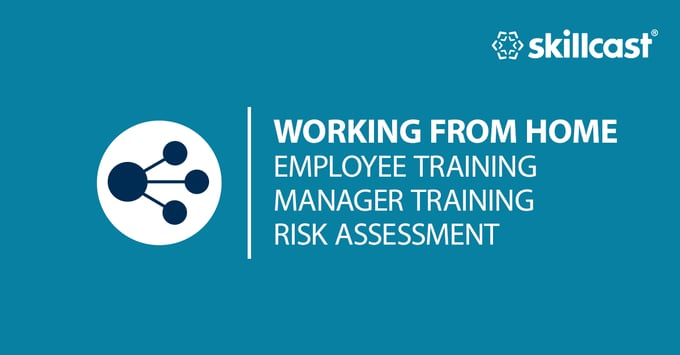Why do employees work from home?
There can be several reasons why employees need, want or are compelled to work from home (WFH). In the UK, after 26 weeks of continuous service, all employees have the legal right to request flexible working, which includes the opportunity to work from home. But, beyond that, there are times when a business may need employees to work virtually or from home - for example:
- Physical disruptions: Including office moves, lack of desk space, extreme weather events and/or power failures
- Financial motivations: Such as hot-desking to reduce costs or when entering new markets
- Talent management: When sourcing top talent from around the world to address skills shortages or forming global teams to service customers in different locations
- Government policy: Risks to health (e.g. coronavirus) or even life itself (e.g. terrorist threats).
WFH compliance, training & assessment roadmap
Even companies with embedded remote working into their business model need to onboard new staff and maintain regulatory compliance. For those that have not, large numbers of employees suddenly working from home creates both a legal and logistical challenge that must be managed properly to mitigate risk.
Our 3-step roadmap for compliance training and assessment will help to put your homeworking environment on a much stronger footing.
WFH Compliance Step 1
10-minute training module for all staff
Start by asking all staff at your firm to take a 10-minute e-learning module on Working From Home to educate and engage with them on their responsibilities, especially concerning health and safety, data protection, information security and general compliance issues, as well as the support available to them to overcome the challenges of home working.
Access this training module free of charge by selecting the button below
Contact us directly if you'd like to customise this training and roll it out to your staff.
WFH Compliance Step 2
15-minute training module for managers
Ask your managers to complete a further 15-minute module on managing homeworkers that explains the legal obligations that firms have to their staff working from home and prepares managers to support, motivate and get the most out of those working from home.
You can access a public version of this module free of charge via the button below.
Contact us directly if you'd like to customise this training and roll it out to your staff.
WFH Compliance Step 3
Self-assessment to manage the risk of working from home
This is an optional step meant for employers who want to go further than the training and get all their employees to go through issues related to Display Screen Equipment (DSE), slips and trips, fire and electrical safety, first aid, lone working, confidentiality and data protection etc. in their home working environment. This supports compliance under the DSE Regulations 1992 (as amended in 2002) and The Management of Health and Safety at Work Regulations 1998.
Skillcast also offers an online self-assessment that all employees can fill out concerning their homeworking environment, DSE, well-being and safety. This can be customised to cover the issues relevant to your business. If an employee flags up an issue, they are questioned further and provided with automated resolutions. If such a resolution is not possible, an alert gets generated for the designated manager(s) to deal with.
Our training aids can help your risk management
We have created some free resources to help you maintain continuity for your business as a whole and your compliance obligations.
- Benchmark crisis planning with our free Business Continuity Management Checklist
- Use our Compliance Continuity Checklist to focus on the five key areas of compliance.
- Understand the essentials of business continuity management.
We also have best practice tips from experts
Check out these blogs for useful insights for your employees, wherever they are located:
- Tips for effective homeworking
- How to stay safe when using display screen equipment
- Tips on how to manage work-related stress
- Suggestions on ways to improve your time management skills
- And finally, how to stay on top of GDPR in times of disruption
Official guidance shapes our homeworking content
All of our training aids and advice are based on the guidelines and recommendations provided by officially recognised bodies, including:
- UK Government flexible working regulations
- ACAS working from home advice
- Health & Safety Executive guidance on protecting homeworkers
These are our regulatory & legal sources
- Health and Safety at Work, etc. Act (HSWA) 1974
Obligations to protect the health, safety, and welfare of employees working from home are the same as those of employees based on-site. - Health and Safety (Display Screen Equipment) Regulations 1992 – as amended in 2002
Obligation to assess and minimise the risks for employees who habitually use DSE. - The Health and Safety (First Aid) Regulations 1981
Obligation to provide adequate first aid provision. - Electricity at Work Regulations 1989
Obligation to maintain electrical equipment provided for work purposes in a safe condition (domestic electrical supply, items and sockets are the employee's responsibility). - Reporting of Injuries, Diseases and Dangerous Occurrences Regulations 1995 (RIDDOR)
Obligation to obtain information from homeworkers on any accidents, work-related ill health, incidents and near-misses and report them to the authorities. - Provision and Use of Work Equipment Regulations 1998
Obligation to control risks to health and safety from all work equipment that homeworkers use. - Working Time Regulations 1998
Obligation to ensure that employees do not work more than 48 hours a week (less for under 18s) unless they have opted out. - The Management of Health and Safety at Work Regulations (1999)
Obligation to conduct a risk assessment of the work activities carried out by home workers. - Equality Act 2010
Obligation to ensure equality and prevent discrimination on the grounds of age, disability, gender reassignment, race, religion or belief, sex, sexual orientation, marriage and civil partnership, and pregnancy and maternity, and also prevent bullying and harassment. - Data Protection Act 2018
Obligation to protect personal data and uphold the rights of individual data subjects. - Other regulations
Obligation to ensure that the employees comply with a wide range of laws covering bribery, anti-money laundering, modern slavery, facilitation of tax evasion, and so on
Want to learn more about Health & Safety?
We've created a comprehensive Health & Safety roadmap to help you navigate the compliance landscape, supported by e-learning in our Compliance Essentials Library.
We also have 100+ free compliance training aids, including assessments, best practice guides, checklists, desk aids, eBooks, games, posters, training presentations and even e-learning modules!
Finally, the SkillcastConnect community provides a unique opportunity to network with other compliance professionals in a vendor-free environment, priority access to our free online learning portal and other exclusive benefits.







